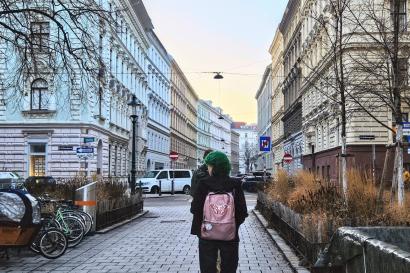Education, education, education, it has become such a buzz word lately that every time I hear it I can’t help but think that some teacher somewhere is regretting Washington’s involvement in his career and personal life. Although serious efforts have been made to improve American education, it seems that the system every year comes under more and more political scrutiny and public disdain. However, taking one step back from the government policies, the inability to effectively integrate parental involvement, and the pain of standardized testing, as a volunteer in a local public Austrian school, I must say, America has some learning to do.
The History of Family is quickly becoming one of the fastest emerging fields in academia. More and more, experts are realizing that the personal is political and when family life and state policy meet, it is often where the public is most vulnerable. At the center of these intersections one will tend to find teachers, who with their enthusiasm, human compassion, and love for children try to balance, academics, wild distant legislators, uninformed parents, and awkward smelling (if teaching middle school) students. Austrian teachers who are now dealing with the children of immigrant parents, who may have little to non-existent German proficiency, have personally felt the impact of personal-public policy. Having the privilege to spend time in an Austrian public school, it seems that most of these schools have, despite the challenges, adapted quite well to the changing social situation in Vienna. Of course, adapting well is not the same as adapting effectively to meeting all the needs of all students. However, the positive adaptability of these schools is found in their acceptance of reality. Their belief that not everyone needs to go to college to be “happy” and that in fact, going to college is not the most beneficial route for all students, is yielding better social results than assumed. Although only obtaining a high school level of education, the children of immigrant parents who may not have proficient German skills, can still go on to become strong contributing members of their new society and the national economy.
Of course, college is an indispensible step towards climbing the social ladder, yet, can it be, that the best and most promising way to manage the waves of children without the necessary language skills, is to indeed help them secure jobs with livable wages? Some might cry foul and list out how such policies are discriminatory against incoming immigrant families and their children. Understandably these advocators are looking at the principle of equality with a severe eye, still, it should be remembered that vocational schools have long been in existence in Austria. Children in the Austrian system, including native speakers, have been sent to these schools without hesitation for decades. The policy of sending children to vocational schools early in their academic careers is not an attitude of segregation but rather an approach to maximize the strengths of differing students.
Of course, I have only been in Vienna for 2 months and I have volumes and volumes to discover about this mysterious, elegant, yet amazingly modern society in Central Europe. Nevertheless, one thing is certain, whether teaching a Serbian, Austrian, Egyptian or Turkish student, these teachers’ personal convictions stand strong. It is obvious that they firmly believe that everyone is entitled to an education, and that the basis for any successful life is undeniably achieved through a strong mind and a refined heart. Truly, it has been refreshing to see a nation who can uniquely appreciate and value blue-collar jobs, understanding that their role is still important and relevant in today’s modern economy.







